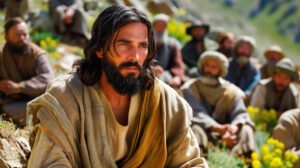Posted by Roberta Grimes • November 15, 2025 • 2 Comments
Jesus, The Teachings of Jesus
For the beauty of the earth,
For the splendor of the skies,
For the love which from our birth
Over and around us lies.
Lord of all, to Thee we raise
This our hymn of grateful praise.
For the wonder of each hour,
Of the day and of the night,
Hill and vale, and tree and flower,
Sun and moon, and stars of light.
Lord of all, to Thee we raise
This our hymn of grateful praise.
For the joy of human love,
Brother, sister, parent, child,
Friends on earth and friends above,
For all gentle thoughts and mild.
Lord of all, to Thee we raise
This our hymn of grateful praise.
– Folliot Sandford Pierpoint (1835-1917), from “For the Beauty of the Earth” (1864)
 My beloved friends, sitting here as we still are on this tall Galilean hill, with the Master sitting just above us on the hill surrounded by His disciples, with the sun higher just beyond the trees and the day growing warm around us now, we can hear that Jesus is getting deeper into sharing with us His saintly wisdom. Those of us here in our little group of only just a few thousand people have walked for days from the far future, just to have this chance to hear Him. To hear humankind’s greatest Teacher! But, we realize now that the valley below us is filling with many more thousands of people, to even beyond what the eye can see. So, how will we find food and water today, and even by nightfall, we are asking one another now. How will we feed and care for our children?
My beloved friends, sitting here as we still are on this tall Galilean hill, with the Master sitting just above us on the hill surrounded by His disciples, with the sun higher just beyond the trees and the day growing warm around us now, we can hear that Jesus is getting deeper into sharing with us His saintly wisdom. Those of us here in our little group of only just a few thousand people have walked for days from the far future, just to have this chance to hear Him. To hear humankind’s greatest Teacher! But, we realize now that the valley below us is filling with many more thousands of people, to even beyond what the eye can see. So, how will we find food and water today, and even by nightfall, we are asking one another now. How will we feed and care for our children?
 Jesus has a very big voice. It carries, even far down across that broad valley below us. There is no word in the literature that I can recall seeing about people having trouble ever hearing Him speaking, even though so many thousands, and sometimes even tens of thousands, would assemble to listen to Him raptly. And they would follow Him, even for days sometimes, so He often had trouble finding ways to feed them. And from our far-future modern vantage point now, we have to wonder, as we listen to Him speaking so beautifully, how He gave such a long and such an organized speech as The Sermon on the Mount, without any notes at all. Still, after all, Jesus came to us as God on earth, did He not? And although He sometimes denies that He was God on earth, He was born to us from the Godhead, so God on earth is what He truly was. And so, perhaps even more to the point, we are wondering now how such a long speech can have been remembered in such a well-organized way, even three centuries after it was given, so it could have been remembered precisely for inclusion in the First Council of Nicaea’s original Christian Bible in 325 CE. The record strongly suggests that Jesus’s words were memorized by His listeners, and were passed down orally for sixty to eighty years before they even were first written down.
Jesus has a very big voice. It carries, even far down across that broad valley below us. There is no word in the literature that I can recall seeing about people having trouble ever hearing Him speaking, even though so many thousands, and sometimes even tens of thousands, would assemble to listen to Him raptly. And they would follow Him, even for days sometimes, so He often had trouble finding ways to feed them. And from our far-future modern vantage point now, we have to wonder, as we listen to Him speaking so beautifully, how He gave such a long and such an organized speech as The Sermon on the Mount, without any notes at all. Still, after all, Jesus came to us as God on earth, did He not? And although He sometimes denies that He was God on earth, He was born to us from the Godhead, so God on earth is what He truly was. And so, perhaps even more to the point, we are wondering now how such a long speech can have been remembered in such a well-organized way, even three centuries after it was given, so it could have been remembered precisely for inclusion in the First Council of Nicaea’s original Christian Bible in 325 CE. The record strongly suggests that Jesus’s words were memorized by His listeners, and were passed down orally for sixty to eighty years before they even were first written down.
 The passage that follows is the second half of Chapter 5 of the Gospel Book of Matthew. It directly follows the Beatitudes that we studied last week, which begin The Sermon on the Mount; and as we did last week, we suggest that you might first read the rest of this blog post, including Thomas’s and my brief parenthetical commentary. Then after that, so you can better experience hearing Jesus directly, you might go back and read just the Gospel Beatitudes in dark print from last week, and then read Jesus’s words in dark print from this week, right after them.
The passage that follows is the second half of Chapter 5 of the Gospel Book of Matthew. It directly follows the Beatitudes that we studied last week, which begin The Sermon on the Mount; and as we did last week, we suggest that you might first read the rest of this blog post, including Thomas’s and my brief parenthetical commentary. Then after that, so you can better experience hearing Jesus directly, you might go back and read just the Gospel Beatitudes in dark print from last week, and then read Jesus’s words in dark print from this week, right after them.
 To best envision that Galilean morning two thousand years ago, please understand that Jesus with His disciples had likely just been walking for days. This was what Jesus very often did, as a charismatic itinerant Teacher. He would walk for days sometimes, stopping often along the way to eat, sleep, teach, and heal people. He could see now that He had gathered a tremendous crowd of listeners along the way: think of ten thousand people, or even more, who were following him just to hear a lot more from Him! He noticed a likely hill that He could teach them from, so he went up the hill maybe thirty or forty feet and sat down, and He called his disciples to come and sit around Him, which was a signal for that gigantic crowd to stop walking and back up and settle down in groups onto the ground all around them and back down that long valley. It is thought that while the crowd was in the process of settling, Jesus gave to mainly his own disciples the more sophisticated teaching that is the Beatitudes, which was what we studied last week. But then, once the crowd had mostly settled, came the literal fire and brimstone that we are about to receive this week!
To best envision that Galilean morning two thousand years ago, please understand that Jesus with His disciples had likely just been walking for days. This was what Jesus very often did, as a charismatic itinerant Teacher. He would walk for days sometimes, stopping often along the way to eat, sleep, teach, and heal people. He could see now that He had gathered a tremendous crowd of listeners along the way: think of ten thousand people, or even more, who were following him just to hear a lot more from Him! He noticed a likely hill that He could teach them from, so he went up the hill maybe thirty or forty feet and sat down, and He called his disciples to come and sit around Him, which was a signal for that gigantic crowd to stop walking and back up and settle down in groups onto the ground all around them and back down that long valley. It is thought that while the crowd was in the process of settling, Jesus gave to mainly his own disciples the more sophisticated teaching that is the Beatitudes, which was what we studied last week. But then, once the crowd had mostly settled, came the literal fire and brimstone that we are about to receive this week!
(What is most surprising about this week’s teaching is that in it, Jesus uses such a thoroughly modern technique. He uses the technique of argument from extremes to altogether reset His listeners’ attitudes toward our relationships with others AWAY from just the minimal standards that the old Judaic Law that they had known for their whole lives required, and TOWARD the utmost perfection that is demanded by God’s new internal Law of Love. There is nothing subtle or even literal about His words here at all, and it would probably be another fifteen hundred years, and well into what we would much later refer to as the Middle Ages, before very much more educated people could be trusted actually to hear some of what Jesus is saying to us today with the same level of sophistication with which Jesus is saying and meaning it! I mean, good grief, did they think he was telling them to cut off hands and pluck out eyes LITERALLY? We can have no way to know how Jesus’s very first listeners heard some of this, but to be frank, until I was maybe fifty years old and I had absolutely convinced myself with a lifetime of afterlife research that there really is no fiery hell, I was pretty alarmed by some of this!)
Personal Relationships (Again, these headings are just in the Bible, and they were of course not spoken by Jesus.)
21 “You have heard that the ancients were told, ‘You shall not commit murder’ and ‘Whoever commits murder shall be liable to the court.’ 22 But I say to you that everyone who is angry with his brother shall be guilty before the court; and whoever says to his brother, ‘You good-for-nothing,’ shall be guilty before the supreme court; and whoever says, ‘You fool,’ shall be guilty enough to go into the hell of fire. 23 Therefore if you are presenting your offering at the altar, and there remember that your brother has something against you, 24 leave your offering there before the altar and go; first be reconciled to your brother, and then come and present your offering. 25 Make friends quickly with your opponent at law while you are with him on the way, so that your opponent may not hand you over to the judge, and the judge to the officer, and you be thrown into prison. 26 Truly I say to you, you will not come out of there until you have paid up the last cent.
(Gehenna was a valley just outside Jerusalem where they burned trash, so fires were always burning there. Depending upon which Biblical translation you read, that word might be translated throughout the Sermon on the mount as “hell of fire”, but I have been kind and done that only the first time it appears here! Just think “hell” each time you see “Gehenna” hereafter. You can imagine how, as a teenager who had not yet begun to do afterlife research and eventually discovered that no hell exists, I had found reading this part of The Sermon on the Mount and found Jesus here repeatedly referencing “hell” to be terrifying!)
27 “You have heard that it was said, ‘You shall not commit adultery’; 28 but I say to you that everyone who looks at a woman with lust for her has already committed adultery with her in his heart. 29 If your right eye makes you sin, tear it out and throw it from you; for it is better for you to lose one of the parts of your body, than for your whole body to be thrown into Gehenna. 30 If your right hand makes you sin, cut it off and throw it from you; for it is better for you to lose one of the parts of your body, than for your whole body to go into Gehenna.
(President Jimmy Carter is remembered for having told us that he was troubled by this passage, because he had, he very sadly said, often looked at women other than his wife with a bit of lust!)
31 “It was said, ‘Whoever sends his wife away, let him give her a certificate of divorce’; 32 but I say to you that everyone who divorces his wife, except for the reason of unchastity, makes her commit adultery; and whoever marries a divorced woman commits adultery.
3 “Again, you have heard that the ancients were told, ‘You shall not make false vows, but shall fulfill your vows to the Lord.’ 34 But I say to you, make no oath at all, either by heaven, for it is the throne of God, 35 or by the earth, for it is the footstool of His feet, or by Jerusalem, for it is the city of the great King. 36 Nor shall you make an oath by your head, for you cannot make one hair white or black. 37 But let your statement be, ‘Yes, yes’ or ‘No, no’; anything beyond these is of evil.
(Some translations say here, “anything beyond these is from the evil one”, and thereby they imply the existence of an incarnate Devil. My afterlife research has never found any evidence for an incarnate Devil as such, so this is another thing that once bothered me about The Sermon on the Mount, but this more accurate translation feels more comfortable.).
38 “You have heard that it was said, ‘An eye for an eye, and a tooth for a tooth.’ 39 But I say to you, do not resist an evil person; but whoever slaps you on your right cheek, turn the other to him also. 40 If anyone wants to sue you and take your shirt, let him have your coat also. 41 Whoever forces you to go one mile, go with him two. 42 Give to him who asks of you, and do not turn away from him who wants to borrow from you.
(I love this! The Code of Hammurabi, or as it is sometimes called, “The Law of Retaliation” dates to about 1790 BCE, and it is said to be the base of the Torah, and therefore of both Jewish and Christian law. Jesus here replaces it with a kind of opposite law of radical peace and perfect love.)
43 “You have heard that it was said, ‘You shall love your neighbor and hate your enemy.’ 44 But I say to you, love your enemies and pray for those who persecute you, 45 so that you may ]be sons of your Father who is in heaven; for He causes His sun to rise on the evil and the good, and sends rain on the righteous and the unrighteous. 46 For if you love those who love you, what reward do you have? Do not even the tax collectors do the same? 47 If you greet only your brothers, what more are you doing than others? Do not even the Gentiles do the same? 48 Therefore you are to be perfect, as your heavenly Father is perfect” (MT 5:21-48).
(Here we learn directly from Jesus that our goal is no longer to keep just the minimal standard of righteously obeying the ancient laws handed down from God thousands of years ago. Oh, no! Now, my dear ones, our goal must be, and it can only be nothing less than to achieve God’s Own level of pure and perfect love!)
 In Chapter Five of the Gospel book of Matthew, Jesus powerfully teaches you and me a full master-class in spiritual growth toward our own personal spiritual perfection. As we go back over last week’s black letters, and then add to them this week’s powerful black letters, we are so grateful to our cherished Elder Brother and Best Friend for the fact that He never talks down to us. No, even though we are still spiritual children, so He is speaking to us in straightforward terms, He does not hold back. He really does tell it to us precisely the way that it is! He knows that when we very soon go home, we are not going to be able to fudge things at all, but we will be able to achieve only the level of the glorious astral plane which is our true home that we have achieved in terms of our growth in love while we were here on earth. We will achieve that, but no higher. So, hold tight now. They are passing the bread and the water-jugs below us in the valley. It is barely noon on this Galilean hill, and we have two more wonderful chapters of the Gospel of Matthew still to go….
In Chapter Five of the Gospel book of Matthew, Jesus powerfully teaches you and me a full master-class in spiritual growth toward our own personal spiritual perfection. As we go back over last week’s black letters, and then add to them this week’s powerful black letters, we are so grateful to our cherished Elder Brother and Best Friend for the fact that He never talks down to us. No, even though we are still spiritual children, so He is speaking to us in straightforward terms, He does not hold back. He really does tell it to us precisely the way that it is! He knows that when we very soon go home, we are not going to be able to fudge things at all, but we will be able to achieve only the level of the glorious astral plane which is our true home that we have achieved in terms of our growth in love while we were here on earth. We will achieve that, but no higher. So, hold tight now. They are passing the bread and the water-jugs below us in the valley. It is barely noon on this Galilean hill, and we have two more wonderful chapters of the Gospel of Matthew still to go….
For the church, that evermore
Lifteth holy hands above,
Offering up on every shore
Her pure sacrifice of love.
Lord of all, to Thee we raise
This our hymn of grateful praise.
For Thyself, best Gift Divine.
To us all so freely given,
For that great, great love of Thine,
Peace on earth and joy in Heaven.
Lord of all, to Thee we raise
This our hymn of grateful praise.
– Folliot Sandford Pierpoint (1835-1917), from “For the Beauty of the Earth” (1864)
(Many photos are from Vecteezy.com)
Appreciate everything Jesus is doing for us and those that help get his teachings out.
He is a awesome big brother.
God our father truly blessed us with the family we have.
Thomas
Oh my dear and so very precious Thomas, thank you! This is perfectly said. We are a very big family indeed of followers of our so deeply loved Elder Brother and our very Best Friend, who has called so many of us to come and share this earthly journey with one another in His love and service. Thank you so very much, dear one, for being such a wonderful part of this family!